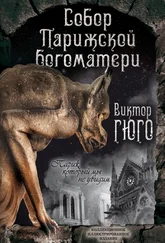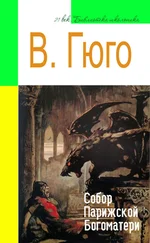| In the meantime, public minor had informed the archdeacon of the miraculous manner in which the gypsy had been saved. |
Между тем молва о чудесном спасении цыганки дошла до архидьякона. |
| When he learned it, he knew not what his sensations were. |
Узнав об этом, он сам не мог понять свои чувства. |
| He had reconciled himself to la Esmeralda's death. |
Он примирился со смертью Эсмеральды. |
| In that matter he was tranquil; he had reached the bottom of personal suffering. |
И был спокоен, ибо дошел до предельной глубины страдания. |
| The human heart (Dora Claude had meditated upon these matters) can contain only a certain quantity of despair. |
Человеческое сердце (так думал отец Клод) может вместить лишь определенную меру отчаяния. |
| When the sponge is saturated, the sea may pass over it without causing a single drop more to enter it. |
Когда губка насыщена, пусть море спокойно катит над ней свои волны - она не впитает больше ни капли. |
| Now, with la Esmeralda dead, the sponge was soaked, all was at an end on this earth for Dom Claude. |
Если Эсмеральда мертва - губка насыщена: в этом мире все было кончено для отца Клода. |
| But to feel that she was alive, and Phoebus also, meant that tortures, shocks, alternatives, life, were beginning again. |
Но знать, что она жива, что жив Феб, это значило снова отдаться пыткам, потрясениям, сомнениям -жизни. |
| And Claude was weary of all this. |
А Клод устал от пыток. |
| When he heard this news, he shut himself in his cell in the cloister. |
Когда он услышал эту новость, он заперся в своей монастырской келье. |
| He appeared neither at the meetings of the chapter nor at the services. |
Он не показывался ни на собраниях капитула, ни на богослужениях. |
| He closed his door against all, even against the bishop. |
Он запер свою дверь для всех, даже для епископа. |
| He remained thus immured for several weeks. |
В таком заточении провел он несколько недель. |
| He was believed to be ill. |
Предполагали, что он болен. |
| And so he was, in fact. |
И это была правда. |
| What did he do while thus shut up? |
Но что же делал он взаперти? |
| With what thoughts was the unfortunate man contending? |
С какими мыслями боролся несчастный? |
| Was he giving final battle to his formidable passion? |
Вступил ли он в последний бой со своей пагубной страстью? |
| Was he concocting a final plan of death for her and of perdition for himself? |
Строил ли последний, план смерти для нее и гибели для себя? |
| His Jehan, his cherished brother, his spoiled child, came once to his door, knocked, swore, entreated, gave his name half a score of times. |
Жеан, его любимый брат, его балованное дитя, однажды пришел к дверям его кельи, стучал, заклинал, умолял, называл себя. |
| Claude did not open. |
Клод не впустил его. |
| He passed whole days with his face close to the panes of his window. |
Целые дни проводил он, прижавшись лицом к оконному стеклу. |
| From that window, situated in the cloister, he could see la Esmeralda's chamber. He often saw herself with her goat, sometimes with Quasimodo. |
Из окна ему видна была келья Эсмеральды; он часто видел ее с козочкой, а иногда с Квазимодо. |
| He remarked the little attentions of the ugly deaf man, his obedience, his delicate and submissive ways with the gypsy. |
Он замечал знаки внимания, оказываемые ей жалким глухим, его повиновение, его нежность и покорность цыганке. |
| He recalled, for he had a good memory, and memory is the tormentor of the jealous, he recalled the singular look of the bellringer, bent on the dancer upon a certain evening. |
Он вспомнил, - он обладал прекрасной памятью, а память - это палач ревнивцев, - как странно звонарь однажды вечером глядел на плясунью. |
| He asked himself what motive could have impelled Quasimodo to save her. |
Он вопрошал себя: что могло побудить Квазимодо спасти ее? |
| He was the witness of a thousand little scenes between the gypsy and the deaf man, the pantomime of which, viewed from afar and commented on by his passion, appeared very tender to him. |
Он был свидетелем коротких сцен между цыганкой и глухим, - издали их движения, истолкованные его страстью, казались ему исполненными нежности. |
| He distrusted the capriciousness of women. |
Он не доверял изменчивому нраву женщин. |
| Then he felt a jealousy which he could never have believed possible awakening within him, a jealousy which made him redden with shame and indignation: |
И он смутно почувствовал, что в его сердце закралась ревность, на которую он никогда не считал себя способным, - ревность, заставлявшая его краснеть от стыда и унижения. |
| "One might condone the captain, but this one!" |
"Пусть бы еще капитан, но он!.." |
| This thought upset him. |
Эта мысль потрясала его. |
| His nights were frightful. |
Ночи его были ужасны. |
| As soon as he learned that the gypsy was alive, the cold ideas of spectre and tomb which had persecuted him for a whole day vanished, and the flesh returned to goad him. |
С тех пор как он узнал, что цыганка жива, леденящие мысли о призраке и могиле, которые обступали его в первый день, исчезли, и его снова стала жечь плотская страсть. |
| He turned and twisted on his couch at the thought that the dark-skinned maiden was so near him. |
Он корчился на своем ложе, чувствуя так близко от себя юную смуглянку. |
| Every night his delirious imagination represented la Esmeralda to him in all the attitudes which had caused his blood to boil most. |
Еженощно его неистовое воображение рисовало ему Эсмеральду в позах, заставлявших кипеть его кровь. |
| He beheld her outstretched upon the poniarded captain, her eyes closed, her beautiful bare throat covered with Phoebus's blood, at that moment of bliss when the archdeacon had imprinted on her pale lips that kiss whose burn the unhappy girl, though half dead, had felt. |
Он видел ее распростертой на коленях раненого капитана, с закрытыми глазами, с обнаженной прелестной грудью, залитой кровью Феба, в тот блаженный миг, когда он запечатлел на ее бледных губах поцелуй, пламя которого несчастная полумертвая девушка все же ощутила. |
| He beheld her, again, stripped by the savage hands of the torturers, allowing them to bare and to enclose in the boot with its iron screw, her tiny foot, her delicate rounded leg, her white and supple knee. |
И вот снова она, полураздетая, в жестоких руках заплечных мастеров, которые обнажают и заключают в "испанский сапог" с железным винтом ее округлую ножку, ее гибкое белое колено. |
| Again he beheld that ivory knee which alone remained outside of Torterue's horrible apparatus. |
Он видел это словно выточенное из слоновой кости колено, выглядывавшее из страшного орудия Тортерю. |

![Виктор Гюго - Собор Парижской Богоматери [Notre-Dame de Paris]](/books/30985/viktor-gyugo-sobor-parizhskoj-bogomateri-notre-thumb.webp)
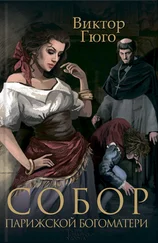
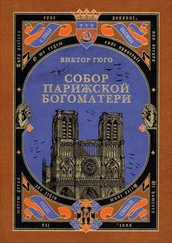
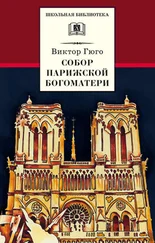
![Виктор Гюго - Собор Парижской Богоматери. Париж [сборник]](/books/398980/viktor-gyugo-sobor-parizhskoj-bogomateri-parizh-sbo-thumb.webp)


